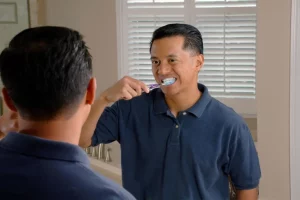
Many people get their new sources online, reading about daily activities, events, and news stories. Keeping up to date with news is not the only thing you can find online. The internet is full of tips on how to live your best life, to be healthy and happy. And one of the areas often overlooked in terms of lifestyle is how to improve your dental hygiene.
Taking care of your teeth is a long-term requirement. It’s not something you can do just once and be done with, just like any form of exercise or self-improvement. Having good teeth involves integrating 5 tips on a daily basis.
Don’t Go To Bed Unless You Have Brushed Your Teeth
This is one of the best tips to improve your dental hygiene. We so often forget that plaque and food particles remain on our teeth long after eating. If you go to bed after having your dinner without brushing your teeth, whatever compounds or sugars, starches from that last piece of bread remain on your teeth will be there throughout the night, eating away at the structure of your teeth until you brush your teeth in the morning. We never forget to brush our teeth before heading out the door to work or school, but we should be just as dedicated to never forgetting to brush our teeth before we go to bed so that any germs and plaque that have built up all day since we brush our teeth in the morning get removed.
Brush The Right Way
The second tip to improve your dental hygiene is to brush the right way. Even if you are brushing your teeth before you go to bed and when you wake up, and for a diligent few after lunch in the office, if you’re not doing it the right way, it won’t be as effective. Doing a bad job of brushing your teeth can be almost as ineffective as not brushing them at all. If you are not sure about the method you are using, you can find videos online or ask your dentist to confirm that you are using the right method. You should be brushing in gentle, circular motions. Plaque starts out softly enough that you don’t have to viciously scrub at your teeth as though you were removing a stain from the oven. Once it hardens with time it can lead to calculus buildup and gingivitis or gum disease so brushing the right way on a regular basis stops this from happening.
Use things like dentomycin.
If you already have early signs of gum disease your dentist might recommend dentomycin. This gel can be very helpful in treating and preventing gum disease. If your dentist recommends a specific type of toothpaste or toothbrush, use that as well. Don’t take those recommendations lightly. They can change the outlook of your oral hygiene quite a bit.
Use A Fluoride Toothpaste
Toothpaste is something taken for granted by most people. Your dentist should be able to recommend the right toothpaste for your situation which is usually a toothpaste that contains fluoride. Most of us focus entirely on a toothpaste that has a good flavor or good whitening powder without recognizing that some toothpaste which claims to whiten your teeth every time you brush with them can cause a lot of harm to your teeth long-term and are not good in spite of those whitening characteristics. But basic toothpaste that is gentle on your teeth and gums with fluoride can help defend against tooth decay and provide a very effective barrier to keep your mouth healthy and safe.
Floss Regularly
As you are starting to integrate new habits into your daily oral routine like brushing your teeth at night, also reconsider your relationship with flossing. Most people who brush their teeth regularly don’t floss and if they do they only floss whenever they feel a piece of food lodged between their teeth. But flossing is what reduces plaque in your teeth, stimulates the gums, and reduces inflammation. You should actually be flossing once every day. Consider that your teeth have four sides and when you brush your teeth no matter how often you are only getting two of those four. Flossing is what helps you get the other two sides of your teeth so don’t be put off by challenges getting the floss in your mouth because there are plenty of tools that can help you floss like ready to use little flossers that fit neatly in your mouth without any difficult wrist turns or twists.








